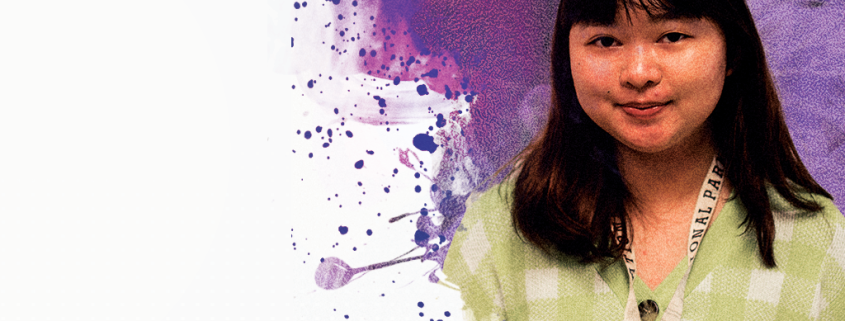Reel LA: ‘Awkwafina is Nora from Queens’ wins its own game
Sometimes, I feel like a loser. I mean that in the most abstract sense, where losing isn’t about being the person who didn’t get three circles in a row but something deeper.
To me, being a loser isn’t really about games at all. It’s about having dreams that don’t come true. At USC, it’s about not getting the grades that I’ve worked for. It’s about getting rejected by peers to hang out, even as I reassure myself that it’s nothing personal and that they’re just busy. It’s about sitting on the Center for International and Public Affairs’ stairs alone — while others are surrounded by friends — and feeling lost on campus. It’s the feeling that I’ve disappointed my parents: that I had an illusion for myself, and that reality decided it wasn’t meant to be.
Being a loser might mean different things to different people, but in the TV series “Awkwafina is Nora from Queens,” most people consider the protagonist Nora Lin (Awkwafina) to be a loser. Nora lives at home in Queens, N.Y. with her dad and grandmother, floats aimlessly through jobs that she has no passion for and generally has no purpose in life. In every sense of the word, Nora is mediocre.
But Nora’s cousin, Edmund (Bowen Yang) isn’t. He’s a successful Stanford graduate who’s well-versed in technology and business until season two where Edmund finds out his mother was a part of the college admissions scandal and that he never got into Stanford on his own merit. Edmund has an identity crisis and decides he wants to become an actor, specifically one in Los Angeles. Nora goes with Edmund on his trip to L.A. Yet, while Edmund quickly creates a new life for himself upon arrival, Nora does not.
In L.A., Nora ends up feeling lonely. She hangs around the hotel by herself and feels as aimless as she did in Queens. Nora FaceTimes her grandmother and her father’s girlfriend, saying that Edmund’s made “like eight friends already” and that she’s just “lone-wolfing” it in the city. Finally, Nora becomes fed up with being alone and calls Edmund, who’s at a party. Furious at not being invited, Nora tells Edmund that she doesn’t know what to do in L.A., and Edmund tells her that he thinks she should go back to Queens.
Nora incredulously responds: “How do you know L.A. isn’t my holy land either?”
“Because you can’t live on your own, Nora,” Edmund says. “Everyone knows that.” He goes on to say that despite Nora wanting to find meaning in her life, she never actually tries.
I guess I just related to this part because at USC, I get the feeling that everyone knows who they are already like Edmund, who’s able to make a bunch of new friends immediately after arriving and become happy. They’re the winners of the city. In contrast, I see myself as Nora, “lone-wolfing” it around campus and around the city, traveling to Koreatown by myself and sitting alone in a food court. Like Nora, I don’t understand how you can make friends so easily or what I’m supposed to do with myself in this city. Living on my own, I feel much like Nora — directionless.
The idea of L.A. as a place where you can find yourself is often represented in popular culture, but I think what Nora learns is that it isn’t the same for everyone. Nora’s connections to her family makes her unable to be truly independent and coming to L.A. doesn’t automatically give her direction for her life. It’s like my favorite SNL skit “Romano Tours” — Joe Romano (Adam Sandler) essentially tells the audience that, unless you change your mindset, going to a new place won’t magically make you happier. Or, as I interpret it: You’re a loser as long as you still think you are. In blunt terms, the problem isn’t the city; it’s you.
Edmund represents the illusion of L.A. and, for me, college life: the idea that you can immediately figure out who you are and where you belong. For me, Nora is the reality.
Sometimes, I feel like I only know who I am when I’m at home in the Bay Area. I ask myself if I’m really trying to find myself in L.A., and I think that I am. Yet, I also have to question whether or not it’s OK to live in reality before trying to become an illusion. Despite desperately wanting to live and love L.A. like Nora, I realize that there are some deeper issues with myself that I have to resolve first. L.A. doesn’t magically define you. You define yourself, and it doesn’t happen immediately.
So, for me, living in L.A. necessitates redefining what it means to be a “loser” in the most abstract sense — telling myself that it’s OK if I don’t get the grade that I worked for, if someone rejects my invitation to hang out and if I eat alone on the steps of CPA. I tell myself that I don’t have to feel like a loser because L.A. isn’t a “game” where you have to win but a playing board where you can decide the direction you take.
In this “game” I’m playing, there’s nothing to lose at all. There’s just taking a few steps forward, maybe going back to the start occasionally, but always ending up wherever you need to be.
Valerie Wu is a junior writing about film, television and visual culture in relation to Los Angeles. Her column, “Reel LA,” runs every other Monday.

